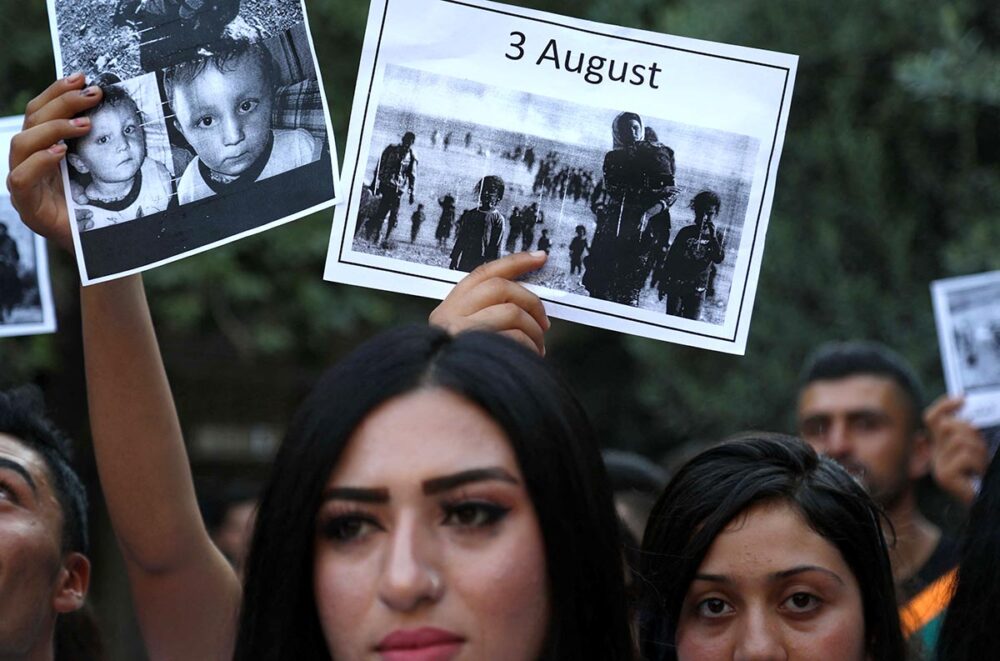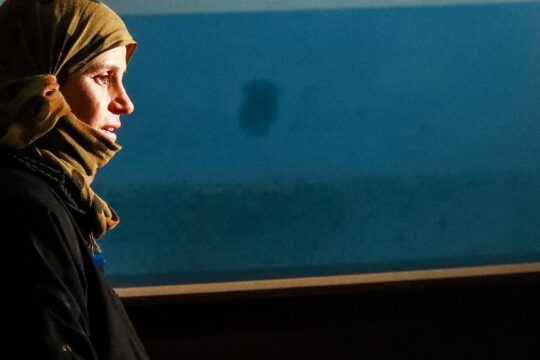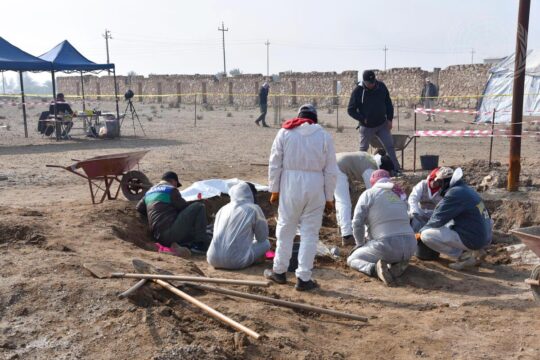The referrals are historic and the charges exceptionally serious. The “crimes against humanity and war crimes” unit of the French National Anti-Terrorism Prosecutor’s Office (PNAT) has announced two “genocide” trials before the Special Assize Court in Paris against three French nationals who belonged to the Islamic State (IS) organization. Until now, French jihadists have only been prosecuted for terrorist crimes. The defendants - one woman and two men - are accused of participating in a “concerted plan” aimed at the “total or partial destruction” of the Yazidi community in Syria and Iraq, a Kurdish-speaking religious minority whom IS considers “infidels”.
A total of two judicial orders have been issued. The first targets the “returnee” Sonia Mejri, currently in French custody, and her ex-husband, Abdelnasser Benyoucef alias Abou Mouthana, presumed dead since 2016. Benyoucef was convicted in his absence for a failed attack on the church in Villejuif, a suburb of the French capital, in April 2015. He is also suspected of being one of the masterminds behind the Hyper Cacher massacre, committed on January 9, 2015 at Porte de Vincennes in Paris, two days after the attack on the satirical newspaper Charlie Hebdo. The second order concerns jihadist Sabri Essid, alias Abu Doujanah al-Faransi. Originally from the Toulouse region, Essid was a member of the Artigat jihadist network and son of a companion of French-Algerian terrorist Mohamed Merah’s mother. He joined the Islamic State organization in Syria in early 2014. He too has been presumed dead since 2018.
Genocide, slavery, torture and rape
In addition to accusations of genocide, all are suspected of having committed several acts that could constitute crimes against humanity as part of “a widespread or systematic attack” against the Yazidi community, and against several women in particular: “enslavement”, “imprisonment”, “torture”, “persecution” and “other inhumane acts”. Essid and Benyoucef are also accused of raping young Yazidi women whom they had bought as part of an IS policy for purposes of sexual and domestic slavery. Some of these young Yazidi survivors are civil parties.
Suspected of having “helped” her ex-husband Benyoucef in the commission of this sexual violence, Mejri has also been charged with “complicity in a crime against humanity”. Mejri is appealing all three charges - genocide, crimes against humanity and complicity in crimes against humanity - according to her lawyer, Nabil Boudi. He says his client has stated that she “was not informed of her husband’s plan to buy a slave”, a plan with which she “disagreed”. On the other hand, according to Boudi, she does not contest the fourth charge against her of “participation in a terrorist criminal association witha view to preparing one or more crimes” for having travelled to Syria and Iraq and joined the Islamic State organization.
French justice the “only path”
For the civil parties’ lawyers, the stakes of these trials are immense. They even represent “the only possible path to justice” for these women enslaved -- sometimes with their children -- and for the entire Yazidi community, says lawyer Clémence Bectarte, who represents two of the female victims and civil parties in the case against Essid. In the course of the investigation, a total of four women and their seven children were identified as victims of the jihadist between 2014 and 2016 in Syria. “My clients were sometimes held by eleven, twelve or thirteen different men, all of French nationality,” continues the lawyer. “What they’re being offered is a trial against one of their tormentors. You can see how unsatisfactory that sounds. But at the same time, it’s essential these trials take place and that there be judicial recognition.”
If Bectarte refers to these trials before a national court as the “only path”, it is also because the International Criminal Court (ICC) has not so far taken up the situation. This, she explains, is because the ICC “focuses on those most responsible for the crimes committed” and because, in this case, “those who could have been identified and for whom the ICC could have had jurisdiction, are dead”. Above all, it is because Iraq and Syria, the two countries where the crimes took place, “are not States Parties to the Court”, as they have not ratified the Rome Statute, continues Bectarte, who is also representing the International Federation for Human Rights (FIDH) in this case.
There is therefore no trial in sight at the ICC. So it is up to national jurisdictions to organize, as will soon be the case in France, trials against their nationals (or foreign refugees on their soil) for crimes they have allegedly committed in the Iraqi-Syrian zone. Some trials have already taken place, notably in the Netherlands and Germany.
A planned policy of extermination and enslavement
Romain Ruiz, lawyer for Rafida Naif who is the only Yazidi slave identified in the proceedings against Sonia Mejri and Abdelnasser Benyoucef, stresses that for his client another thing is very important -- “being able to talk about the genocide of the Yazidis”, a policy of extermination and enslavement planned and initiated from August 2014 when IS jihadists invaded and besieged the Sinjar region in north-eastern Iraq, cradle of the Yazidi community.
In just a few days, thousands of people were executed, most of them men. Women and girls over the age of nine were captured and sold into sexual and domestic slavery, while young boys were converted and recruited into the “lion cubs of the Caliphate”, trained to kill and die as martyrs. “Rafida was in Sinjar at the time of the IS offensive. Her family was decimated or captured, and she and her sisters were taken and sold on a slave market,” explains Ruiz. It was there that the 16-year-old was allegedly bought by a first jihadist, then sold on to Benyoucef and Mejri. “What she wants now is a future,” says the lawyer.
A “structural” probe into the genocide
As early as 2015, several investigative reports, including that of a mission from the UN’s Office of the High Commissioner for Human Rights, recognized the genocide. In France, a so-called “structural” investigation was opened in 2016 by the “crimes against humanity” unit, then attached to the Paris public prosecutor’s office and now attached to the PNAT. It’s objective is “to document the crimes and identify French jihadists who are members of the Islamic State organization and may be involved in these acts committed in the Iraqi-Syrian zone against minorities, not just the Yazidis”, explains Sophie Havard, head of the PNAT’s “crimes against humanity and war crimes” unit. This structural investigation concerns all “minorities”, including Christians, for example.
Despite the impossibility of gaining access to Syrian territory and so to the “crime scenes”, a great deal of evidence and over a hundred testimonies have been gathered, she explains, “including around 60 hearings of Yazidi witnesses and victims”. This is thanks to associations and non-governmental organizations involved in this evidence-gathering work, as well as to various collaborations between investigation services. In particular, the PNAT unit relied on “jurisdictional investigation mechanisms”: the United Nations special investigative team for Iraq UNITAD, whose work was completed in September 2024; and the International, Impartial and Independent Mechanism for Syria (IIIM), based in Geneva.
In 2021, France and Sweden also set up a joint investigation team to gather information on foreign fighters’ abuses against the Yazidis and identify suspects among their own nationals, under the aegis of the European agency Eurojust. This team was later joined by Belgium and the Netherlands.
Sonia Mejri alone on the stand
The structural investigation, which is still ongoing, has led to the identification of several French jihadists, including Essid. According to the specialized Unit, a total of at least eight individual proceedings relate specifically to crimes committed against Yezidis in Syria and Iraq.
But while three people have been referred to the Paris court, only Mejri will appear physically at her trial, provided that the charges are confirmed on appeal. The two other suspects, who are presumed dead, will have a “trial by default”, in their absence. While this practice is not new with regard to terrorism, it is new for international crimes cases. “The PNAT has jurisdiction because of the nationality of the perpetrators, and - without certain proof of their death - we have decided to prosecute them,” says Havard. In practical terms, this means trying the defendants “on the assumption” that they are still alive.
“There is no provision in French law for the appointment of a defence lawyer in a criminal case in absentia,” she adds. And if there were a lawyer, “he or she would be completely unaware of the accused’s position on the facts. So it’s hard to imagine how they could effectively defend and present a coherent line of defence when the accused has never been questioned”. However, if one or more lawyers were to appear at the start of hearing to represent their clients, adds the public prosecutor, they would be able to attend the entire proceedings and present their observations to thecourt. In the event of Benyoucef and Essid being found and arrested, they could request a retrial.







